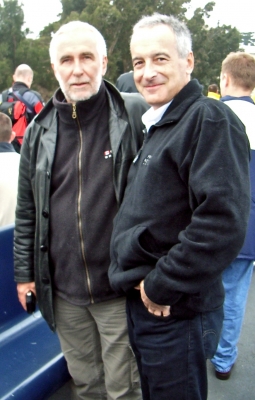Abrantes or Dunbar—Who’s the Best?

The other day after a seminar, an attendee came to join me at the pool table. I have a habit of selecting the bar with the most decent pool table as my after hours office wherever I happen to give a seminar. I invite the attendees to join me there in the evening, assuring them that they will be most welcome to ask me any question they like; and indeed they do, they approach the pool table, drink in one hand and pool cue in the other; and fire away.
Balls racked up, I took the break, didn’t pocket any balls, didn’t scratch and passed the game to my opponent, a local, female dog trainer in her late twenties. She took a shot and missed. Then, she looked at me with a radiant, slightly coquettish smile.
“Is it now that I can ask you any question I like?” she enquired teasingly.
“Yes, it is, but please do it before or after I take my shot,” I replied, stressing the words before and after.
“Ok then,” she said. I could see her formulating the question in her mind before the actual words materialized. “Your approach to training is so different to Ian Dunbar’s,” she said finally with a slightly furrowed brow.
It was my turn to smile, “That’s not a question, that’s a statement,” I said jokingly while I chalked the tip of my cue. “Really?” I added slightly theatrically.
“Yes,” she continued eagerly,“ I’ve just been to one of his seminars. What do you think?”
“Equal or different?” I asked rhetorically, “I don’t know, I have never thought of it that way. I don’t know exactly how Ian trains particular skills, but I’m sure it’s good.”
“Interesting!” she exclaimed slowly, syllable by syllable, “How can you say so emphatically that it is good and yet admit you don’t know exactly what it is? Didn’t you recommend as recently as this afternoon that we question everything and never rely on authorities just because they are so? You called that authority bias, didn’t you?”
“Yes, I did, but I’m not committing authority bias by believing that what Ian does is right, just because it is Ian. I question all authorities, including and mainly myself when I’m supposed to be one,” and I approached her as if I were going to tell her a trade secret.
“In this case, I’m relying on the WHATFOR principle,” I said with an enigmatic air.
“The WHATFOR principle?” she asked with a furrowed brow.
“Yes, the ‘Wise, Honorable And Trustworthy Friend’s Own Record,” I explain. Since I don’t have the time to check everything for my self, I select a few people, very few, who I trust and know well to do it for me, so to speak. I know Ian’s record. I’ve known him since we were young and hopeful, I know what his principles are and I know his integrity. That’s why, not because he’s an authority. I can do that, but you can’t. You can’t just accept what Ian or I tell you without questioning it because you don’t know us that well. It would be too risky for you to do so.”
“Okay,” she said pensively, in two very distinct syllables, fidgeting with the cue and chalk. “And that is enough?”
“That’s more than enough for me; and, by the way, we do question ourselves and one another,” I replied. “Of course, you’ll find similarities and differences between us. There will always be similarities and differences. We are not the same person even though we think alike in many respects. We are similar enough to understand one another and work together toward a common goal; and reasonably different to be able to inspire one another with new ideas. That’s the most important thing I think, but making comparisons doesn’t get us anywhere. I don’t think there is one single better or best way. That depends on the user. Some will find one way better, others the other. Of course Ian and I are different. In the end, no two trainers do the same thing the same way, not even our twin brothers would.”
“Oh, you both have twin brothers!” she exclaimed, all thrilled and wide eyed.
“No, we don’t,” I observed calmly, a touch sorry to dishearten her.
“Interesting,” she uttered again, syllable by syllable, visibly puzzled whilst looking long and deeply into her beer glass. I found it appropriate to call my shots and pocketed three balls.
It was when I was getting ready to go for the next shot that she continued.
“Sorry to bother you with all these questions, but I find it fascinating and I really have so much to ask. I want to become a good trainer.”
“No worries, just fire!” I hastened to say. “It’s your turn by the way,” I added, turning my eyes to the table.
She pocketed a ball, called an apparently easy, but long, shot and missed. Her bridge was very unstable, her mind apparently not on the game.
“It’s because I want to choose a training method,” she explained, turning to me, “and I like both yours and Ian’s, but they are so different that I don’t know what to do. OK, at least you agree with the way Ian trains dogs even if you do things differently.”
“It all depends on how you look at it,” I exclaimed. “When I look at Ian working with a dog, I don’t look with my feelings and emotions, I detach myself from my own particular thoughts and feelings, and Ian’s way looks good to me. I don’t even put myself in agree/disagree mode. If I always look at things with my own limited repertoire of emotions as a reference, I will miss a lot, maybe even the whole lot .”
I got ready to take my next shot, but she didn’t allow me to.
“And then?… Please, continue, “she begged,” and I indulged her.
“You’ll become a good trainer if you’re patient and diligent, if you take the time to study behavior and the principles of learning in depth and get the necessary experience. You must be open-minded and critical at the same time, not an easy task. Don’t discard a theory just because you don’t like it, and don’t accept another just because it apparently suits your own immediate goals. Don’t approve of an argument just because you like the person who uses it; and don’t reject one because you don’t like the person behind it. Then, you’ll become a good trainer and you know what?” I asked, pausing for effect.
“No, please tell me!” she pleaded.
“And you’ll be a different trainer, different from Dunbar and Abrantes because you’ll be your own.”
“Wow,” she cried out, “I hope you’re right!”
“I am, but you must be careful and wise. One method does not necessarily need to be better or worse than any other. It all comes down to what level of detail you want to go into and, in the end, what kind of person you are. There are many ways to do the same. Look at life, so many ways to live, so many life forms and yet the same goal, to live as long as possible and preferably pass your genes to the next generation. Ian’s way is great on one level and mine, hopefully, on another. I like to think they supplement or complement one another. Ultimately, it doesn’t really matter.” I said and added with a sheepish smile, “Einstein didn’t prove that Newton was wrong. They are both right. It all depends on what level of reality you’re looking at.”
I left her pondering for a while, I called my next shots and pocketed four more balls. I had a good pool night.
“This becomes more and more interesting,” she said and laughed. “So you and Ian are looking at two different levels of the same reality. Never thought about it that way.”
“Maybe we are,” I said.
I took a sip of my beer and called “Eight in the corner.”
“Well, maybe you’re right. I think I can see now that your methods are not so different after all. It’s all a question of detail,” she said, sort of summing up her thoughts.
“Anyway, you do look alike,” she added jokingly, “you are both intriguing and you both drink beer,” and she laughed wholeheartedly while I pocketed the eight.
“But Ian beats you,” she added with an extra giggle, “he drinks more beer than you.”
“That may be,” I said, “but I beat him in pool!”
Rack ’em up! Life is good!
R-




